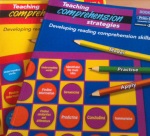Of all the things I teach, I find reading comprehension the hardest. The retrieval type questions are OK, as are the technique ones, but teaching things like inference is quite tricky. I’ve found a workaround by teaching it from the opposite direction – giving the children a piece to read where the characters are shaking or crying and asking how they can tell the character is sad, scared, etc.
It’s really hard to find good resources to help though. There are books with lots of practise questions, but if you don’t know how to answer them then no matter how many questions you attempt, you still won’t be able to.
 At last I have found a solution. It’s a series of books called Teaching Comprehension Strategies from Prim-Ed. They take the various types of questions: summarising, predicting, concluding etc and explain step by step how to answer each type. Each question type is split into three stages. On the first page are some multiple choices with an explanation for each choice as to why that answer is good, unlikely, perfect or impossible. Next up are a few questions with hints on where to look and how to work out the answers. To finish are questions to answer independently with no clues.
At last I have found a solution. It’s a series of books called Teaching Comprehension Strategies from Prim-Ed. They take the various types of questions: summarising, predicting, concluding etc and explain step by step how to answer each type. Each question type is split into three stages. On the first page are some multiple choices with an explanation for each choice as to why that answer is good, unlikely, perfect or impossible. Next up are a few questions with hints on where to look and how to work out the answers. To finish are questions to answer independently with no clues.
As a bonus, the books aimed at younger readers are not at all babyish, so I can use them with my struggling readers without them feeling demotivated at reading things aimed at “babies”.
I’ve found them really useful, and the feedback I’ve had from the children I’ve used them with has been really positive, both in terms of usefulness and enjoyment.
Related post: Beast Quest Comprehension


